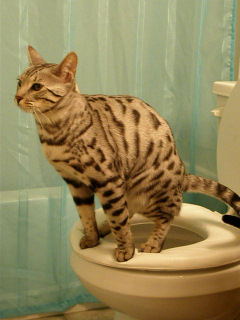Dangers of Flushing Cat Poop Down Your Toilet - Avoid Potential Issues
Dangers of Flushing Cat Poop Down Your Toilet - Avoid Potential Issues
Blog Article
This post which follows in relation to How to Dispose of Cat Poop and Litter Without Plastic Bags is quite interesting. Don't miss it.

Introduction
As pet cat owners, it's important to bear in mind exactly how we take care of our feline pals' waste. While it may appear practical to flush pet cat poop down the commode, this practice can have destructive repercussions for both the environment and human health and wellness.
Alternatives to Flushing
Luckily, there are safer and extra responsible methods to dispose of pet cat poop. Take into consideration the following choices:
1. Scoop and Dispose in Trash
The most common approach of getting rid of pet cat poop is to scoop it right into an eco-friendly bag and toss it in the trash. Make sure to make use of a committed clutter scoop and dispose of the waste without delay.
2. Use Biodegradable Litter
Select biodegradable feline clutter made from materials such as corn or wheat. These trashes are eco-friendly and can be securely taken care of in the trash.
3. Bury in the Yard
If you have a yard, think about hiding pet cat waste in a marked location far from vegetable gardens and water sources. Be sure to dig deep enough to prevent contamination of groundwater.
4. Set Up a Pet Waste Disposal System
Purchase an animal waste disposal system specifically developed for cat waste. These systems make use of enzymes to break down the waste, lowering odor and environmental influence.
Wellness Risks
Along with ecological issues, flushing pet cat waste can likewise position wellness dangers to people. Pet cat feces may have Toxoplasma gondii, a parasite that can create toxoplasmosis-- a potentially serious illness, especially for expectant women and people with damaged immune systems.
Environmental Impact
Flushing feline poop presents hazardous microorganisms and bloodsuckers right into the water supply, positioning a considerable threat to marine ecological communities. These impurities can negatively impact aquatic life and concession water quality.
Conclusion
Liable family pet ownership extends past offering food and sanctuary-- it likewise entails appropriate waste management. By refraining from purging feline poop down the bathroom and choosing alternative disposal approaches, we can minimize our ecological footprint and safeguard human health.
Why You Should Never Flush Cat Poop Down the Toilet
A rose by any other name might smell as sweet, but not all poop is created equal. Toilets, and our sewage systems, are designed for human excrement, not animal waste. It might seem like it couldn’t hurt to toss cat feces into the loo, but it’s not a good idea to flush cat poop in the toilet.
First and foremost, assuming your cat uses a litter box, any waste is going to have litter on it. And even the smallest amount of litter can wreak havoc on plumbing.
Over time, small amounts build up, filling up your septic system. Most litter sold today is clumping; it is made from a type of clay that hardens when it gets wet. Ever tried to scrape old clumps from the bottom of a litter box? You know just how cement-hard it can get!
Now imagine just a small clump of that stuck in your pipes. A simple de-clogger like Drano isn’t going to cut it. And that means it’s going to cost you big time to fix it.
Parasitic Contamination
Believe it or not, your healthy kitty may be harboring a nasty parasite. Only cats excrete Toxoplasma in their feces. Yet it rarely causes serious health issues in the cats that are infected. Most people will be fine too if infected. Only pregnant women and people with compromised immune systems are at risk. (If you’ve ever heard how women who are expecting are excused from litter cleaning duty, Toxoplasma is why.)
But other animals may have a problem if infected with the parasite. And human water treatment systems aren’t designed to handle it. As a result, the systems don’t remove the parasite before discharging wastewater into local waterways. Fish, shellfish, and other marine life — otters in particular — are susceptible to toxoplasma. If exposed, most will end up with brain damage and many will die.
Depending on the species of fish, they may end up on someone’s fish hook and, ultimately on someone’s dinner plate. If that someone has a chronic illness, they’re at risk.
Skip the Toilet Training
We know there are folks out there who like to toilet train their cats. And we give them props, it takes a lot of work. But thanks to the toxoplasma, it’s not a good idea.

As a keen reader about How to Dispose of Cat Poop and Litter Without Plastic Bags, I think sharing that excerpt was worth the trouble. Liked our article? Please share it. Help somebody else discover it. We truly appreciate reading our article about Can You Flush Cat Poop Down The Toilet?.
Quote Report this page